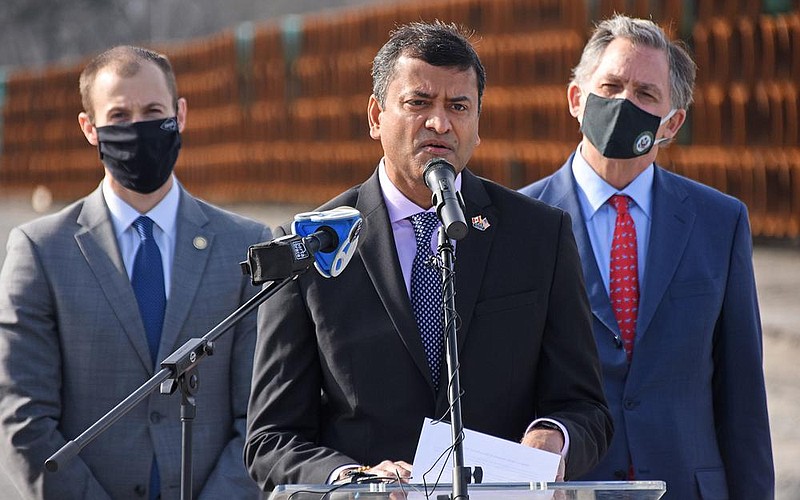If anyone's job immediately appeared at risk at the Port of Little Rock because of the cancellation of the Keystone XL Pipeline project, no one was confirming that publicly Friday.
But the port's biggest employer and biggest revenue producer, Welspun Tubular LLC, is counting on its contract from the pipeline's owner to help sustain Welspun's 600 employees, it's top local executive said.
Welspun has added 50 people to its port facility workforce since the contract was announced in August, said Rajesh Chokhani, Welspun's chief operating officer.
State and local officials gathered with executives from Welspun and other private companies on Friday in front of 36-inch radius pipes stacked in long rows within Welspun's 740-acre facility, to underscore the economic risk to Central Arkansas as a result of the Biden administration's decision to kill the $8 billion Keystone project, which would carry oil from Canada to the Gulf Coast.
"I would echo Canadian Prime Minister Trudeau's statement calling this decision a 'disappointment,'" U.S. Rep. French Hill, R-Ark., said at the news conference, which his office helped arrange. "If President [Joe] Biden wants unity, stripping Arkansans of hard-earned jobs amidst a pandemic is not a step in the right direction."
[Gallery not loading above? Click here for more photos » arkansasonline.com/130welspun/]
Mike Preston, the Arkansas' commerce secretary, called the decision "disappointing," coming at a time when "we're moving the needle and getting people back to work."
The state's unemployment rate fell to 4.2% in December from its pandemic high of 10.8% in April. Preston called the Keystone decision an unnecessary "federal roadblock" to increasing employment.
The pipes already have been purchased by Calgary, Alberta's TC Energy, which now likely will have to sell them at a discount -- and depress Welspun's prospects for new pipe orders -- unless the administration reverses the decision, which Hill and others hope remains a possibility.
The contract -- for 190 miles of pipe -- was signed not long after Welspun laid off 400 employees. The 600 employees now have been working seven days a week on new pipe orders. That cannot be sustained without Keystone, Chokhani said.
Jay Chesshir, the president and chief executive officer of the Little Rock Regional Chamber of Commerce, said the Keystone cancellation will create uncertainty, especially in the pipeline industry.
The project cancellation occurred at the same time the administration placed a pause in the development of oil and gas leases on federal public lands, which would have been another source of business for Welspun and other pipe producers.
Without Welspun, it would be hard for the port to sustain itself at the level it has, said Bryan Day, the port's executive director.
At the news conference, Day introduced Fred Long, general manager for Logistic Services Inc., the company that loads and unloads the barges for the port under contract, to illustrate Welspun's impact on port operations.
Since Welspun arrived at the port, barge traffic has doubled to 450 a year. From 2016 through 2020, the port's docks unloaded 1.7 million tons of steel coil Welspun uses to produce its pipe from 1,071 barges, which represented 46% of all dock activity.
The Welspun facility, which opened in 2007 at a cost of $150 million, was responsible for 1 out of every 12 barges that rolled upriver during the same period. In 2019, the ratio was 1 of every 7 loaded barges.
In that same period, the company's products moved on 5,000 rail cars within the port.
Welspun's activity has spurred more than $10 million in capital projects at the port, including additional rail and another dock.
Long said Welspun's impact affects the river's economic ecosystem far beyond the port.
Its barges, with the steel coil gone, return downriver loaded with soybeans and other farm products. Transportation costs would be higher for farmers without those empty barges needed to be returned downriver and make their produce prices less competitive in the marketplace, Long said.
Layoffs already are happening at other pipe producers.
Berg Pipe, manufacturer of wide diameter pipes for the oil and gas industry and based in Panama City, Fla., is planning to eliminate 25 jobs on Feb. 27, , while temporarily laying off 62 and cutting the hours of another 46 workers, according to the Florida Sun Sentinel.
It isn't clear whether the personnel cutbacks are associated with Keystone, but Berg, which has pipe production facilities in Panama City and Mobile, Ala., announced in August that TC Energy had awarded the company a contract that the company said would keep hundreds of its workers in both cities busy into 2021.
Mike Nunnenkamp, a top executive at Dunn Transportation, also spoke and the news conference. He is the third generation of his family to run the Sherman, Texas, company, which specializes in transporting pipe.
The company's business was hit hard by the pandemic, he said. So work on the Keystone XL pipeline was a "blessing" for Dunn, Nunnenkamp added.
He agreed, to a point, with critics who say many of the jobs that Biden's executive order would cost were temporary construction jobs. They last a few weeks, usually a few months and often not as long as the Keystone jobs would have lasted, he said.
"We've had temporary jobs for 110 years," Nunnenkamp said, referring to the founding of his company in 1910. "Jobs like Keystone don't come along very often."

